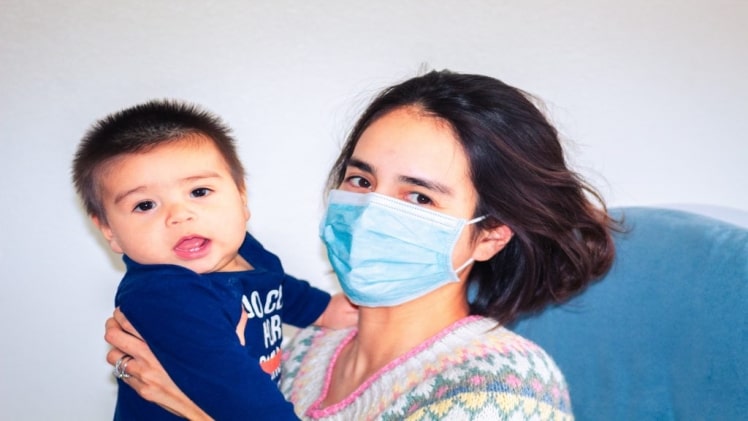Children born either during or just before the pandemic are showing signs of slower development. They even have a name to identify them—the COVID generation. It is these children that are talking, walking, and interacting less frequently and later than the children born before them. They are also prone to such behaviors as separation anxiety, physical aggression, and outbursts.
Self-Isolation at Home Has Been a Factor
Experts point to various reasons why the COVID generation differs from the ones before and claim that factors resulting from the pandemic have had an impact. These children stayed indoors, in their rooms, and did not have a lot of outside exposure, which reduced access to child care and health care. Plus, the emotional and financial stress felt by the adults in many of these households was absorbed by the developing brains of these children.
What They Had to Say
Rahil Briggs, who is in charge of HealthySteps, a U.S.-wide program designed to give families early childhood support at their pediatric visits, states, “The infant-toddler brain is the best sponge you could ever buy. It sucks up everything really good and everything really bad.” This verifies the position that the COVID generation has been impacted by the exposure to very different circumstances and situations than in non-pandemic days.
Jamiylah Miller, a home-based educator from the Early Head Start program, a national learning program designed for families with a child on the way up to three years of age, adds, “We (adults) have the language to express what it is we’re feeling, what it is we’re thinking. When we disagree, we can say we disagree. With children, it shows up primarily in their behavior.” COVID generation children have been identified as having more difficulty sharing, paying attention, or playing with others.
Studies Show Differences in Development
There have been some studies on the topic of early development in children born as part of the COVID generation. They all indicate that these children are behind their older peers in many ways. The COVID-19 Mother Baby Outcomes study conducted by Columbia University found that children born during the pandemic, on average, score lower on tests of various skills including gross and fine motor, problem-solving, and social interaction.
Studies from the LENA Foundation and Rhode Island Hospital revealed that pandemic babies vocalize and participate in verbal interactions less than pre-pandemic babies. The researchers say that reduced exposure and increased stress levels of caregivers are to blame. Others say that mask-wearing and screen time are contributing factors. Children not being able to see adult mouths moving behind a mask has impacted their speech development as they learn how to form sounds by watching mouths move. Facial expressions are also a form of communication, and pandemic babies were robbed of this process with faces partially hidden behind masks.
An early childhood research group, RAPID-EC, found that over half of the children from homes that suffered severe financial hardship when the pandemic began faced emotional stress. Donna Housman, founder of the Housman Institute and child development expert, says that children “develop within the context of relationships.” Family units experienced a breakdown of those relationships when the pandemic introduced financial burdens to many households not prepared to deal with the circumstances.
Staffing Issues in the Child Care Sector
Four sources, through two surveys, confirm that the child care sector does not have enough providers. HiMama, a software company, determined through a study that 48% of the child care sector lacked enough staff. The Center for Law and Social Policy, the National Women’s Law Center, and the Century Foundation all found that the child care workforce has fallen more than 10% from pre-pandemic figures.
Over the years, the United States has been described as a place where more than half the parents in the country live in what have been termed “child care deserts.” These are places that are either underserved or do not have child care available. These conditions exist only because of staffing issues. Unless something changes soon to encourage more entrepreneurs to enter the field, the number of available childcare seats will slowly dwindle.
Parents Try to Cope
What about the parents of these children? Many of them have described the past two-plus years of living in a pandemic as trapping them in a chaotic world that seemingly has no way to escape. Parents seem so involved in trying to sort out their own COVID-induced issues, that they are not aware of what has been happening to their children. According to Emily Levitt, vice president of education at Sylvan Learning, “We often get this question of, ‘Is this child pandemic behind, or are they actually behind? And getting to the correct answers for each child is not always easy.”
Typically, parents are always physically and emotionally there for their children. The pandemic put a wedge between parents and children where it became harder and harder for parents to cope with their changing situations and still meet the needs of their children. Jennifer Boss of ZERO TO THREE says, “It’s really hard to be present and responsive to your child when you yourself are stressed and dealing with your trauma.”
Hardship Chain Reactions
Then there is the situation that many low-income families found themselves in during the pandemic. This demographic was more likely to lose loved ones and their jobs, which produced a chain reaction of hardship after hardship. According to the RAPID-EC project lead investigator Phil Fisher, this type of cycle makes regular, daily routines seem out of reach. Included in those routines is home child care. He says, “The ability to provide nurturing and supportive care—it gets increasingly challenging to the extent that people are preoccupied with obtaining basic needs. For any individual kid, if you want to know how they’ve been doing, it’s very tied to how parents are doing.”
Final Thoughts
The COVID generation is a generation of children born just before and during the pandemic. Due to pressures within their home environment, these children have become developmentally slower than the children born before them. It will be interesting to see what happens once these children reach adulthood and how their coping skills will help them in the future.
Sandra Chiu works as Director at LadyBug & Friends Daycare and Preschool


